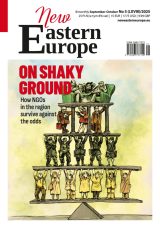
Europe has become steadily more introspective since the financial crisis broke out in 2008, writes Andrew Wilson. Moreover, with the refugee crisis and the Paris attacks grabbing European and global media attention, and Russia suddenly becoming an ally in the fight against ISIS, it seems that Ukraine has become a topic of the past. But should the West lose focus, Ukraine’s chances of success will be very slim.


